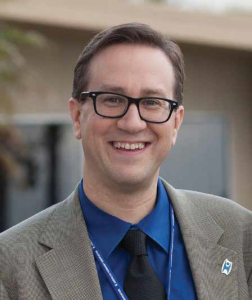Creating Change through Humanism

Humanist leaders look for media opportunities to explain our positions to the general public, and are usually countered by decidedly non-humanist opponents. In his new book, Creating Change through Humanism, American Humanist Association Executive Director Roy Speckhardt describes one such exchange:
When the AHA ran the “Why believe in a god? Just be good for goodness’ sake” bus advertisements in 2008, I was called to appear on CNN Headline News opposite the demagogue Catholic League President Bill Donohue. Donohue had the audacity to call our open-ended question “hate speech” while simultaneously comparing humanists to Jeffrey Dahmer and Adolf Hitler. He said that it was impossible to be good for goodness’ sake and that our ad was a personal attack on his faith.
Fittingly, that exchange appears in a chapter titled, “Prejudice Humanists Face.” I view the conversation be-tween Donohue and Speckhardt as a humanist version of “the good news.” The author’s gentle demeanor and rational arguments made humanists proud and earned respect even from many Christians who are continually embarrassed by Donohue’s victimhood rants.
Every recent Pew survey about religion confirms rapid movement away from Christianity into either the “none” or the humanist/atheist camp. People like Donohue (inadvertently) and Speckhardt (advertently) are partially responsible for this seismic shift in public opinion. For many years, Speckhardt has been living humanism and organizing humanists. I’m pleased he’s now recorded that experience in a helpful book on creating change through the philosophy and lifestance he’s come to know so well.
Bill Donohue aside, some Christians believe that Jeffrey Dahmer and Adolf Hitler are enjoying a happier afterlife than will Speckhardt and other humanists. You see, on May 10, 1994, Dahmer was baptized and “saved” in prison, so presumably he died a Christian in good standing. Hitler, too, was baptized as a Catholic and never left the church, nor was he excommunicated. For his part, Speckhardt describes becoming alarmed when one local radio host exclaimed that people like him shouldn’t exist and called for something to be done about it. “But when he closed with saying, ‘You’ll get yours in the afterlife,’ I was relieved,” he writes in Creating Change. “As long as he doesn’t incite his right-wing followers to act in the here and now, I’m happy to take my chances and face whatever follows a long and happy humanist life.”
I’m confident that Speckhardt will have the same afterlife as that radio host, Dahmer, and Hitler. Unless, of course, you define “afterlife” as the repercussions of any good works you’ve done that survive after your death. Then Speckhardt will have a terrific afterlife, further enhanced by Creating Change.
There are many books by atheists with excellent arguments for not believing in any gods, including those by Richard Dawkins, Ayaan Hirsi Ali, Lawrence Krauss, Daniel Dennett, Christopher Hitchens, Steven Pinker Sam Harris, and Rebecca Goldstein. Speckhardt’s book is not one of those books, though his makes a strong case for why we can be good (I say, better) without belief in any gods.
Creating Change through Humanism instead builds on the other books and asks: “Now what? Where do we go from here?” and thoughtfully provides useful answers.
What’s the difference between humanism and atheism? I think of them as two sides of the same coin. Atheism is about what we don’t believe in (gods or any other forms of supernaturalism), while humanism is about what we do value and support (the scientific method, critical thinking, an egalitarian-based sense of fairness, a positive outlook on life, and much more). People are free to identify with whichever label they feel most comfortable. I usually prefer “atheist” because it’s more understandable and gets more attention, though which label I use depends on the context of a situation. Speckhardt, as the head of a national humanist organization, rightly leads with “humanist,” and he is hoping with this book to help make that label as widely understood as “atheist.”

Author Roy Speckhardt
Another point the book makes is that our secular community needs to cooperate on issues that affect us all, rather than divide ourselves according to labels and relatively minor differences. Speckhardt wants humanists and nontheists of all stripes to unite in coalitions of the willing on every important challenge today so that we can move in an enlightened direction tomorrow.
The book begins with a basic overview of humanism and asks readers, “Is humanism right for you?” (Answer: since you’re reading this review in this publication, it probably is.) Speckhardt sprinkles his book with stories, including his own, about evolving thoughtfully from faith-based traditions to humanist convictions. He demonstrates ways to use humanism in your life and be open about your beliefs. He also points out problems humanists face in hostile environments and suggests ways to arm yourself (with information, not guns) and win people over, or at least help them understand how humanists think and what we try to do to make things better for all.
We have one life to live in a morally neutral world that’s part of a vast, indifferent universe, but Speckhardt describes how we have learned that cultivating empathy and compassion can lead people to be more altruistic. The responsibility for our lives and the kind of world in which we live is ours and ours alone. There may not be a purpose to life, but humanists create our own purposes in life.
“Applied humanism” is a wonderful term and an even better concept. This book recommends positions and courses of action, along with political engagement and social activism. It also shows how humanists have been ahead of the curve on a number of hot-button issues like women’s rights, LGBT equality, and environmental concerns.
Finally, for those who believe in God, Speckhardt improves on “God.” He doesn’t provide us with a Ten Commandments by which to live our lives mindlessly, but he does provide us with “Ten Commitments” by which to live our lives mindfully. These commitments are written on paper and open to amendments, not on tablets where amendments might be considered heresy. Given a careful reading of both, I would not be surprised if most progressive Christians wind up preferring these commitments to those famous commandments.
To illustrate, here is the tenth for each:
Tenth Commandment: Though shalt not covet thy neighbor’s house, wife, slaves, ox, donkey, or any other property that is thy neighbor’s.
Tenth Commitment: Service and Participation. Life’s fulfillment can emerge from an individual’s participation in the service of humane ideals.
As he does in the rest of the book, Speckhardt gives examples of ways to fulfill this commitment.
As Fox News might say about which to prefer: “We report. You decide.”
